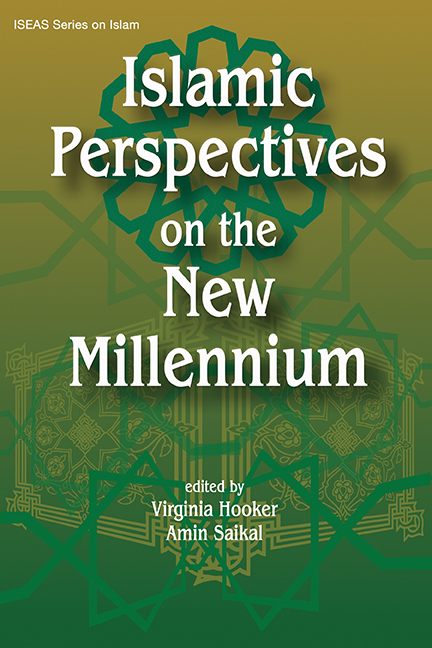Book contents
- Frontmatter
- Contents
- Acknowledgements
- Contributors
- 1 Islamic Perspectives on the New Millennium
- The New World Order
- The New Age
- The Economy
- The Nation-State
- Muslim Women
- Law and Knowledge
- 12 Perspectives on the Shari'a and the State: The Indonesian Debates
- 13 The Role of Muslims in the New Millennium
- Conclusion
- Glossary
- Index of Names
- Index of Subjects
12 - Perspectives on the Shari'a and the State: The Indonesian Debates
from Law and Knowledge
Published online by Cambridge University Press: 21 October 2015
- Frontmatter
- Contents
- Acknowledgements
- Contributors
- 1 Islamic Perspectives on the New Millennium
- The New World Order
- The New Age
- The Economy
- The Nation-State
- Muslim Women
- Law and Knowledge
- 12 Perspectives on the Shari'a and the State: The Indonesian Debates
- 13 The Role of Muslims in the New Millennium
- Conclusion
- Glossary
- Index of Names
- Index of Subjects
Summary
The last century saw the reformulation of shari'a into European forms (codes, statutes, and cases) throughout the Muslim world. As part of this, the sphere of the shari'a has also been restricted to family law and trusts. The result is a triumph for secularization in that we now have laws for “Muslims” rather than “Islamic” law as such. That this is the case in the new millennium should not surprise us; it is an inevitable result of direct colonial rule added to — since the 1950s — by a voluntary acceptance of Western canons of jurisprudence especially in the Middle East. In a very real sense as well, it is the logical result of the works of Muhammad ‘Abduh and his followers whose reduction of the classical fiqh to a “natural law” has been amply documented. In short, the nation-state now determines the definition of shari'a in all the lands of Islam; the ummah is no longer the primary point of reference, instead it is the constitution(s) of the state(s) which defines Islam.
This chapter attempts to answer two questions for Indonesia: firstly, how did the state come to dominate?; and secondly, is the apparent dominance of the state necessarily permanent?
STATE DOMINANCE IN THE TWENTIETH CENTURY
Before coming to the debates which form the subject of this chapter it is necessary to list in short form the institutional structures through which the state dominates and determines Islam. These have been discussed elsewhere but I give the appropriate references for those who are unfamiliar with the subject.
• The Dutch colonial period. In 1882 a “Priest Court” was established for Java and Madura. It had limited jurisdiction in marriage, divorce, and wakaf. It could not enforce its own decisions which had to be approved by the Landraad (civil) courts. The 1882 regulation was amended in 1937 with a wider jurisdiction and powers of enforcement in respect of dowry and maintenance. The system was extended to South and East Borneo in 1938. Overriding jurisdiction was always in the secular courts.
• The Republic of Indonesia 1946–91. A Ministry of Religion was established in 1946 with supervision of the religious courts. The latter, based on the Dutch model, was extended to Sumatra and the Outer Islands until 1989 when a new Law on Basic Religious Justice was introduced. Its effect was to incorporate the religious courts within the general legal system.
- Type
- Chapter
- Information
- Islamic Perspectives on the New Millennium , pp. 199 - 220Publisher: ISEAS–Yusof Ishak InstitutePrint publication year: 2004

